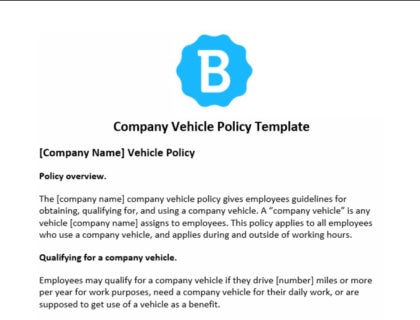
Paul Peters is the Chief Editor of Betterteam. He's a former print journalist and small business owner and has written articles for a variety of newspapers, magazines and websites.

A company vehicle policy, or company vehicle use agreement, establishes which employees are eligible for a company fleet vehicle. It also outlines the requirements for qualifying for a company car, basic rules employees must follow when using company vehicles, and disciplinary action for misusing vehicles.

Download this free company vehicle policy template and tailor it to your company's needs. Instant download, no email required.
When an employee uses a company vehicle for personal use it is considered a taxable fringe benefit. Personal use includes commuting to or from work, running errands, or allowing a spouse or family member to use the vehicle.
There are several ways to calculate personal use:
The [company name] company vehicle policy gives employees guidelines for obtaining, qualifying for, and using a company vehicle. A “company vehicle” is any vehicle [company name] assigns to employees. This policy applies to all employees who use a company vehicle, and applies during and outside of working hours.
Employees may qualify for a company vehicle if they drive [number] miles or more per year for work purposes, need a company vehicle for their daily work, or are supposed to receive the use of a vehicle as a benefit.
If you have not been assigned a company vehicle and believe you need one, contact HR.
To be eligible for a company vehicle, employees must complete a form and submit a copy of their driver’s license. Employees are only allowed to drive a company car if they have a valid driver’s license and a clean driving record for at least [X years].
A clean driving record means the employee has not been held at fault for a car accident or arrested on charges of violating vehicle and traffic laws. [Company name] can assign and revoke access to company vehicles at its discretion.
[Company Name] will make reasonable accommodations to facilitate company vehicle use for eligible employees with disabilities.
[Company name] [does not allow/on a case-by-case basis allows] personal use of company vehicles. Personal use includes using the vehicle for personal errands between business activities, to commute between the workplace and home, or using the vehicle outside of business hours. [All work safety rules continue to apply when a company vehicle is used for personal purposes.]
Employees who violate company vehicle rules are subject to disciplinary actions which may include verbal and written warnings, suspension of vehicle privileges, termination and legal action.
In case of an accident, contact the HR department immediately. They will contact the insurance provider. Follow legal guidelines for exchanging information with other drivers and report the accident to local police if required. Do not guarantee a payment or accept responsibility without company authorization.